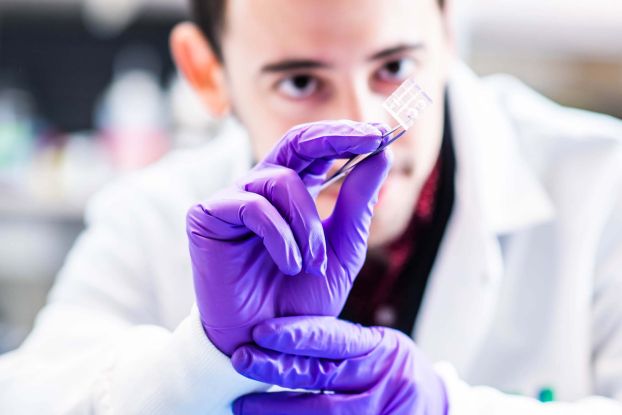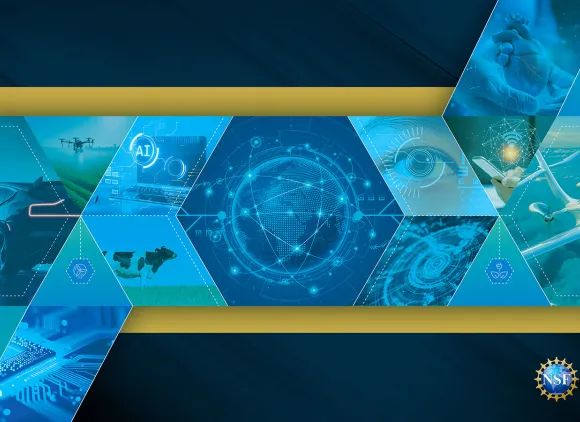What are ERCs?
ERCs are interdisciplinary, multi-institutional centers designed to advance fundamental knowledge and technology while training a diverse, skilled engineering workforce.
Each ERC has important components that go beyond the research project, including:
- Engineering workforce development at all participant stages.
- A culture of diversity and inclusion where all participants gain mutual benefit.
- Value creation within an innovation ecosystem that will outlast the lifetime of the ERC.
NSF funds each ERC for up to 10 years.
Current ERCs
NSF currently supports 16 ERCs in advanced manufacturing, energy and the environment, health and microelectronics.

NSF ERC for Cell Manufacturing Technologies (CMaT)
Established in 2017, CMaT's vision is to enable robust, scalable, low-cost biomanufacturing of high-quality therapeutic cells to bring affordable, curative therapies against incurable chronic diseases to everyone.
Four core partners:
- Georgia Tech (lead)
- University of Georgia
- University of Puerto Rico-Mayagüez
- University of Wisconsin-Madison
NSF ERC for Hybrid Autonomous Manufacturing Moving from Evolution to Revolution (ERC-HAMMER)
Established in 2022, the HAMMER ERC will accelerate the development and deployment of intelligent, autonomous manufacturing systems, enabling mass customization in local production facilities.
Five core partners:
- The Ohio State University (lead)
- Case Western Reserve University
- North Carolina Agricultural and Technical State University
- Northwestern University
- University of Tennessee, Knoxville
NSF Engineering Research Center for Transformation of American Rubber through Domestic Innovation for Supply Security (NSF TARDISS ERC)
Established in 2024, the NSF TARDISS ERC will create bridges between engineering, biology, and agriculture to revolutionize and on-shore alternative natural rubber production from U.S. crops.
Five core partners:
- The Ohio State University (lead)
- Caltech
- North Carolina State University
- Texas Tech University
- University of California, Merced
NSF ERC for Advancing Sustainable and Distributed Fertilizer Production (CASFER)
Established in 2022, the CASFER ERC will enable resilient and sustainable food production by developing next-generation, modular, distributed and efficient technology for capturing, recycling and producing decarbonized nitrogen-based fertilizers.
Five core partners:
- Texas Tech University (lead)
- Case Western Reserve University
- Florida A&M University
- Georgia Institute of Technology
- Massachusetts Institute of Technology
NSF Engineering Research Center for Advancing Self-Sufficiency through Powered Infrastructure for Roadway Electrification (ASPIRE)
Established in 2020, NSF ASPIRE seeks to revolutionize transportation by developing electrified roadways and intelligent charging networks to eliminate EV range and charging barriers, reduce transportation costs, and strengthen the electric grid and the economy.
Four core partners:
- Utah State University (lead)
- Purdue University
- University of Colorado
- The University of Texas at El Paso
NSF Engineering Research Center for Carbon Utilization Redesign for Biomanufacturing (CURB)
Established in 2024, NSF CURB will create bio-manufacturing systems that use CO2 as a feedstock for a broad range of products much more efficiently than current state-of-the-art engineered and natural systems.
Four core partners:
- Washington University in St. Louis (lead)
- Prairie View A&M University
- Texas A&M University
- University of Delaware
NSF Engineering Research Center for Environmentally Applied Refrigerant Technology Hub (NSF EARTH)
Established in 2024, NSF EARTH will create a transformative, sustainable refrigerant life cycle to increase the energy efficiency of heating, ventilation and cooling.
Six core partners:
- University of Kansas (lead)
- Lehigh University
- University of Hawaii
- University of Maryland
- University of Notre Dame
- University of South Dakota
NSF ERC for Innovative and Strategic Transformation of Alkane Resources (CISTAR)
Established in 2017, CISTAR's vision is to create a transformative engineered system to convert light hydrocarbons from shale resources to chemicals and transportation fuels in smaller, modular, local and highly networked processing plants.
Five core partners:
- Purdue University (lead)
- Northwestern University
- University of Notre Dame
- University of New Mexico
- The University of Texas at Austin
NSF ERC for Advanced Technologies for Preservation of Biological Systems (ATP-Bio)
Established in 2020, ATP-Bio aims to stop biological time by designing methods to cryogenically cool, hold and re-warm living materials without harm, extending the ability to bank and transport them.
Four core partners:
- University of Minnesota (lead)
- University of California, Berkeley
- University of California, Riverside
- Massachusetts General Hospital
NSF ERC for Cellular Metamaterials (CELL-MET)
Established in 2017, CELL-MET aims to transform cardiovascular care by combining breakthroughs in nanotechnology and manufacturing with tissue engineering and regenerative medicine, while also developing expertise in education, diversity, administration and outreach.
Three core partners:
- Boston University (lead)
- Florida International University
- University of Michigan
NSF ERC for Precise Advanced Technologies and Health Systems for Under-resourced Populations (PATHS-UP)
Established in 2017, PATHS-UP is developing revolutionary, cost-effective technologies and systems to improve healthcare for under-resourced populations.
Four core partners:
- Texas A&M University (lead)
- Florida International University
- Rice University
- UCLA
NSF ERC for Precision Microbiome Engineering (PreMiEr)
Established in 2022, This ERC will foster safer indoor environments by developing technologies that prevent the spread of disease and promote the proliferation of beneficial microorganisms.
Five core partners:
- Duke University (lead)
- North Carolina Agricultural and Technical State University
- North Carolina State University
- University of North Carolina at Chapel Hill
- University of North Carolina at Charlotte
NSF Engineering Research Center for Human AugmentatioN via Dexterity (NSF HAND)
Established in 2024, HAND will revolutionize the ability of robots to augment human labor by transforming dexterous robot hands into versatile, easy-to-integrate tools.
Four core partners:
- Northwestern University (lead)
- Carnegie Mellon University
- Florida A&M University
- Texas A&M University
- With engagement of MIT
NSF ERC for the Internet of Things for Precision Agriculture (IoT4Ag)
Established in 2020, IoT4Ag seeks to ensure food, energy and water security with new systems to increase crop production while minimizing energy and water use and environmental impacts of agricultural practices.
Four core partners:
- University of Pennsylvania (lead)
- Purdue University
- University of California, Merced
- University of Florida
NSF ERC for Quantum Networks (CQN)
Established in 2020, CQN aims to lay the foundations for a socially responsible quantum Internet by developing key subsystem technologies and new functional building blocks that connect quantum processors locally and across the globe.
Four core partners:
- University of Arizona (lead)
- Harvard University
- Massachusetts Institute of Technology
- Yale University
NSF ERC for Smart Streetscapes (CS3)
Established in 2022, CS3 is forging livable, safe and inclusive communities through real-time, hyperlocal technologies for streets and their surroundings.
Five core partners:
- Columbia University (lead)
- Florida Atlantic University
- Lehman College
- Rutgers University
- University of Central Florida
Related funding
Gen-4 Engineering Research Centers (ERC): Supports high-risk, high-payoff research focused on advancing engineered systems technology and education through multidisciplinary, cross-sector partnerships.
Planning Grants for Engineering Research Centers: Facilitates the formation and enhancement of convergent research collaborations in the engineering community, resulting in center-scale, high-risk, high-payoff research.


